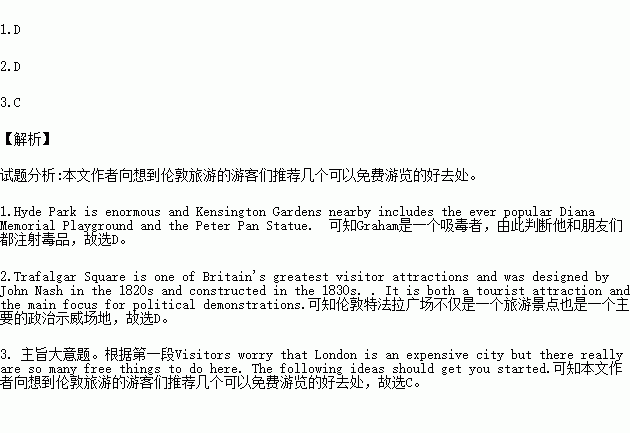题目内容
Visitors worry that London is an expensive city but there really are so many free things to do here. The following ideas should get you started.
All of London's major museums are free, but most offer some special exhibitions for a fee. My favorite is the Museum of London where you can learn the history of London from Roman times to today. And I love the Geffrye Museum which shows English domestic interiors and helps bring to life what it was really like to live in London.
I regularly hear people tell me the Queen Mary's Rose Gardens in Regent's Park is their favorite spot in London, and who am I to argue? I would also recommend St. James's Park as it offers one of the best views of Buckingham Palace. Hyde Park is enormous and Kensington Gardens nearby includes the ever popular Diana Memorial Playground and the Peter Pan Statue.
No visit to London is complete without seeing this military tradition. The Queen's Guard in London changes in the Forecourt inside the gates of Buckingham Palace at 11.30am every day in the summer and every other day in the winter. Get there early and view the spectacle from outside the front gates.
Trafalgar Square is one of Britain's greatest visitor attractions and was designed by John Nash in the 1820s and constructed in the 1830s. This iconic square has many sights to see including Nelson's Column and the National Gallery. It is both a tourist attraction and the main focus for political demonstrations. Every December, Norway donates a marvelous Christmas tree, to thank Britain for liberation from the Nazis.
1. Where can visitors find the Peter Pan Statue?
A. in Regent's Park. B. in St. James's Park.
C. in Hyde Park. D. in Kensington Gardens.
2. Which of the following descriptions is True?
A. In the Geffrye Museum visitors can learn the history of London from Roman times to today.
B. The Queen Mary's Rose Gardens is in Buckingham Palace.
C. There is the Queen's Guard change inside the gates of Buckingham Palace at 11.30 am every day all year around.
D. Trafalgar Square is both a tourist attraction and a place for political demonstrations.
3. The writer wrote the passage to ________.
A.compare some free places in London.
B. advertise some free places in London.
C. recommend some free places in London.
D. expose some free places in London.
 口算心算速算应用题系列答案
口算心算速算应用题系列答案 同步拓展阅读系列答案
同步拓展阅读系列答案
